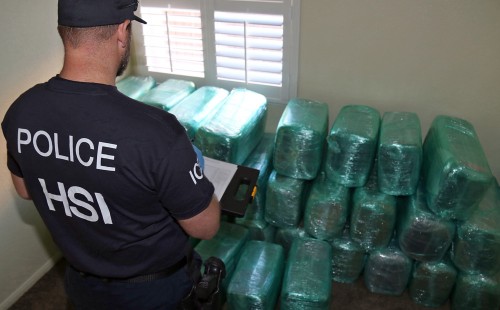SAN DIEGO — U.S. authorities on Wednesday shut down a cross-border tunnel that ran the length of four football fields from a restaurant in Mexicali, Mexico, to a newly built house in Calexico, California, following an investigation that netted more than 1,300 pounds of marijuana and resulted in four arrests.
The tunnel was the 12th completed secret passage that U.S. authorities have discovered along California’s border with Mexico since 2006. They have found more than 75 along the entire U.S.-Mexico border in the last five years, mostly in California and Arizona and many of them incomplete.
Drug traffickers allegedly purchased the Calexico property in April for $240,000 and finished building a three-bedroom house on the parcel for $86,000 by December. Prosecutors say the first tunnel shipment occurred Feb. 28, leading to the seizure of 1,350 pounds of marijuana in Los Angeles.
Mexico marijuana coming into the U.S.
Stats: Mexican pot production is declining as legalization in the U.S. flourishes
Veggie surprise: Border police find 2,493 pounds of weed in fake carrots
Major haul: 12 tons of pot found in elaborate tunnel on Mexico-U.S. border
Weed news and interviews: Get podcasts of The Cannabist Show.
Subscribe to our newsletter here.
Watch The Cannabist Show.
The tunnel extended about 300 yards in Mexico from El Sarape Mexican restaurant and ran about 100 yards on U.S. soil to the house in a quiet residential area of Calexico, a city of about 40,000 people located 120 miles east of San Diego.
“This house and tunnel were constructed under the watchful eye of law enforcement,” said Laura Duffy, U.S. attorney for the Southern District of California. “For the builders, the financiers and the operators of these passageways, there is no light at the end of the tunnel. We will seize your drugs and your tunnel before you even have a chance to use it.”
Two men were arrested Wednesday in Calexico — one at the tunnel house and another at a house believed to have been used to store drugs — and charged drug trafficking crimes, authorities said. Two women were arrested Tuesday in Arizona, including the purchaser of the Calexico house.
Dave Shaw, special agent in charge of U.S. Immigration and Customs Enforcement’s Homeland Security Investigations in San Diego, said the investigation was “still very much ongoing.”

Mexico’s Sinaloa cartel has long controlled drug trafficking along the border in California’s Imperial Valley, which offers easy freeway access to Los Angeles and Phoenix. The group’s leader, Joaquin “El Chapo” Guzman, escaped from Mexican prison in July through a tunnel and was captured again in January.
The latest discovery is the first completed tunnel found in a decade in Calexico, which is less of a draw for drug traffickers than San Diego because the soil is harder and the city is largely residential, authorities said. San Diego’s tunnels are concentrated in an industrial area whose warehouses are considered easier to mask drug-laden trucks.
The Calexico tunnel lacked hallmarks of more sophisticated tunnels that have been discovered between San Diego and Tijuana, Mexico, such as lighting, rail cars and hydraulic lifts, said Sherri Hobson, an assistant U.S. attorney.
Homeland Security Investigations said another house and a warehouse in Calexico were designated to store marijuana until drivers could take the drugs farther north.
